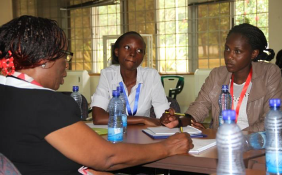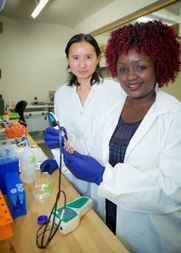Problem
Women scientists are significantly under-represented in research. The gender gap in research limits the development of new research agendas to identify and address gender differences in infectious disease, many of which women are at greater risk of contracting than men for many reasons, including biological differences, social inequities, and restrictive cultural norms.
Proposed solution

In an effort to address gender imbalance in infectious diseases research, women scientists at Kenya Medical Research Institute (KEMRI)’s Centre for Global Health Research in Kisumu (western Kenya) held a 5-day workshop to introduce and equip 20 aspiring women scientists in 5 public universities in western Kenya with proposal, research ethics and manuscript development skills and provide them with mentoring support.
Background
Situated in East Africa, Kenya shares its northern border with Ethiopia and the northwestern part with South Sudan; its western border with Uganda, its eastern border with Somalia, and its southern border with Tanzania, with the Indian Ocean in the southeast. Ranked as a lower middle-income country, Kenya has in recent years enjoyed political stability and economic growth. It has 46 million inhabitants, the majority of whom live in rural areas, and a high burden of infectious diseases.
Despite having a strong scientific publishing record and a high number of researchers, only 26% of researchers in Kenya were women in 2010 (UNESCO Institute for Statistics, 2015). Gender imbalance exists in secondary and tertiary education, with female enrolment at secondary level being lower (65%) when compared with male enrolment (70%), and at the tertiary level, 3.3% in female enrolment when compared with male enrolment at 4.8% (UNESCO Institute for Statistics, 2015).
In recent years, Kenya has taken steps to address gender inequality and as part of the country’s Vision 2030, has adopted a strategy to mainstream gender in science that is embedded in the Science, Technology and Innovation Act (2013), which recognizes women’s under-representation in leadership positions in academic and research institutions and in scientific and professional associations.
Increasingly, academic and research institutions in Kenya are implementing measures to support women’s participation in leadership positions, including adopting gender mainstreaming frameworks to promote gender equality and ensure women’s participation in all spheres. At the same time, institutions such as the Kenya’s National Commission for Science and Technology (NACOSTI) have designated funds to enable women scientists to conduct research, while the Nairobi-based African Academy of Sciences (AAS) has allocated travel grants to support women scientists to travel to conferences and other fora to present their research findings. Similarly, networking opportunities for women scientists at international fora such as the Federation of African Immunological Sciences (FAIS) and the proposed establishment of Kenya Association of Women in Science (KAWIS) are important venues for women scientists to seek professional support and network.
What was done

Elizabeth Ochola (pictured right in the foreground), is a research officer at the Kenya Medical Research Institute (KEMRI)’s Centre for Global Health Research, a centre for excellence in infectious diseases in western Kenya. During her early years as a scientist, she felt she lacked the skills to develop quality proposals and access to networking opportunities.
“These are barriers that can hinder a researcher from laying the foundation needed for a long-term career as a research scientist,” she says. This was the seed for her proposal.
A week-long workshop provided 20 aspiring women scientists with one-on-one mentoring support from early-career women scientists such as Elizabeth and established women scientists from academic and research institutions in Kenya. This provided them with an opportunity to ask questions and obtain feedback and invaluable advice about how to manage the demands of a challenging professional career while maintaining work/life balance from mentors. They delved into research topics of interest and learned new skills. With the help of their mentors, they developed proposals on infectious diseases, some of which have been submitted as proposals for grant funding.
The mentoring project supported the development of a network. This in turn led to a platform to facilitate information sharing and allow for much-needed professional support to aspiring women scientists in the 5 Kenyan universities.
Impact
Some of the aspiring women scientists developed proposals on infectious diseases which are being reviewed prior to submission for grant funding. In addition, they established informal Google and WhatsApp Groups that will facilitate information sharing and provide much-needed professional support.

